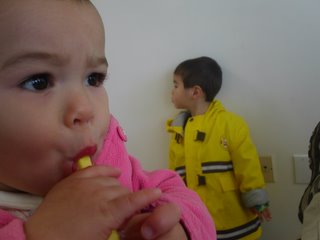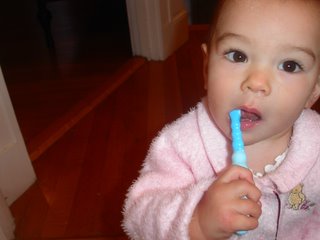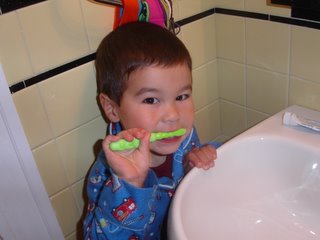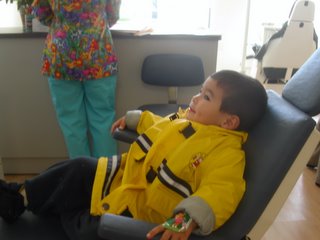 Sources:
Sources:1. "A Practical Guide to Infant Oral Health" by Joanna Douglass, DDS, Alan Douglass, MD, and Hugh Silk, MD, from American Family Physician 70:11, December 1, 2004
2. Our dentist and her hygienist, Dr. Jolle Hami 1864 Centre St West West Roxbury, MA 02132 (617) 327-4321
3. A colleague of Julie's who did a fellowship on pediatric oral health.
Source #1 is in front of me, I saw #2 yesterday and #3 is from memory.
Nutrition:
The main thing everyone says is not to give children sweetened drinks, i.e. juice (1,2,3). Natural occuring sugars tend not to promote tooth decay, that is the lactose in milk and dairy products and the fructose in fruit and vegetables, but sugar added to food will.
The authors of (1) also suggest limiting snacks to set times rather than having constant food around.
Brushing at Home:
Okay, so when are you supposed to start brushing? As soon as the kid has teeth (1,2,3).

And here's the part that's confusing: should you use a flouride toothpaste? Flouride is important to protect the teeth but too much is not good either. Swallowing 5 mg fluoride per kg of the child's weight "can cause nausea and vomiting." (1) [That's half a tube for the average five year old.]
That's the extreme case. A little bit too much fluoride will cause fluorosis (1,2), "an unaesthetic mottling of the teeth." (1)
This is where you branch off on the decision tree. If your water supply is low on fluoride (less than 0.6 parts per million) then your child should use fluoride supplements from about 6 months of age (1).
If you live in a municipal area where the water is fluoridated, as it is here in Boston, it will most likely be above 0.6 ppm (optimally it will be at 1.0 ppm) (1,2,3). In that case, your child is getting enough fluoride through the drinking water (1,2,3).
And they don't have to drink it. They are getting enough fluoride from the water you cook with and the water that you washed an apple with, etc (2,3).
So, if your water is fluorinated, what do you do about toothpaste? Well, you can get infant toothpaste without fluoride (Tom's of Maine makes some) or you have to get your kid to spit out the toothpaste. General guidelines will say that you should start using fluoride toothpaste when your child is 2 years old, but it's all based on when they can learn to spit (1,2).
In our case, Mari (13 months) is using toothpaste without fluoride and Austin (32 months) is using toothpaste (still kiddie flavored) with fluoride. (For those wondering, Tom's strawberry toothpaste for kids tastes like strawberry bubblegum that loses its flavor really quickly)

How do you get your kids to brush? There are articles about this in parenting magazines I'm sure, but here are a couple of tips that worked for us:
-Let them watch you brush. They love to imitate, those little monkeys.
-Sing a song about brushing that is consistent and thereby gives them a sense of how long the brushing will take (Catherine R. suggested it and Julie does this)
-Explain which teeth you are brushing so they expect a certain pattern and will wait until all the teeth are brushed (this is what I do)
-Wait until they shout "NO!" and then shove the toothbrush in. Sometimes crying is good for something.
Flossing:
Flossing is mostly necessary between molars (2). Austin has two molars on top and four on the bottom so we were told to floss between the pairs of molars on the bottom once a day. This should be fun.
Dental Visits:
 This is something that surprised me. The American Academy of Pediatric Dentistry and the American Academy of Pediatrics recommend that kids see a dentist by around 12 months (1,2,3). Check with your health insurance; with these new recommendations, insurers --health insurers, not dental -- are paying for dental health for children.
This is something that surprised me. The American Academy of Pediatric Dentistry and the American Academy of Pediatrics recommend that kids see a dentist by around 12 months (1,2,3). Check with your health insurance; with these new recommendations, insurers --health insurers, not dental -- are paying for dental health for children.
There are specifically trained pediatric dentists. This is a specialty and not every dentist will deal with children under 3. Call around or search the web.
The first visit is basically a checkup, to count teeth and to get kids accustomed to the dentist. The dentist also takes time to explain to parents how to brush the teeth and give advice like this.
 The kids are supposed to return every 6 months. At the latest visit, Austin had his teeth polished and a fluoride treatment. He got stickers afterward and was very pleased.
The kids are supposed to return every 6 months. At the latest visit, Austin had his teeth polished and a fluoride treatment. He got stickers afterward and was very pleased.
Conclusion:
The teeth: something else to worry about.
Bonus bizarre fact:
Poor oral hygiene in pregnant women is correlated with premature birth (1).

No comments:
Post a Comment